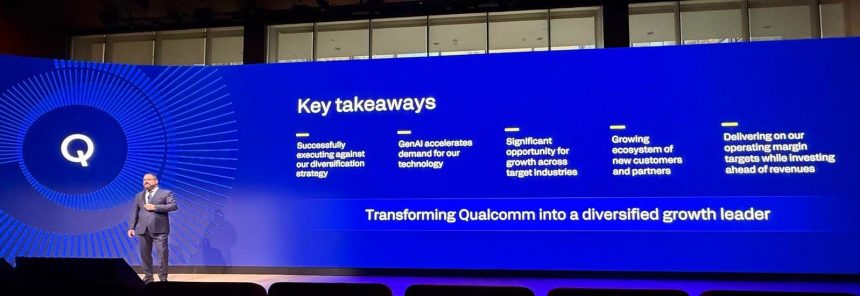Qualcomm’s recent performance showcases a remarkable transformation driven by strategic diversification and robust execution. The company, once predominantly reliant on the mobile handset market, has successfully expanded its reach into automotive, Internet of Things (IoT), and even the competitive PC market. This strategic shift, spearheaded by CEO Cristiano Amon, has resulted in impressive financial results and a strengthened position across multiple technology sectors. Qualcomm’s transparency in articulating its goals and consistently achieving them underscores a disciplined approach to business management and instills confidence in its future trajectory.
The mobile handset market remains a significant revenue driver for Qualcomm, accounting for a substantial portion of its overall earnings. Despite the maturity of this market, Qualcomm has achieved impressive growth, outpacing the overall market by a significant margin. This continued success is attributed to the company’s cutting-edge Snapdragon processors, which boast superior CPU and NPU performance, especially in AI processing. These advancements, coupled with Qualcomm’s expertise in low-power, high-connectivity chip design, have solidified its leadership position in the mobile space. The company’s focus on performance per watt positions it advantageously in a computing landscape increasingly prioritizing energy efficiency.
Qualcomm’s foray into the automotive sector has been nothing short of remarkable. While automotive revenue currently represents a smaller percentage of the overall business, the company has secured a massive pipeline of future projects with leading automakers. This rapid growth reflects the automotive industry’s ongoing transformation into software-defined vehicles, a trend that perfectly aligns with Qualcomm’s strengths in connected car technologies. The Snapdragon Digital Chassis, integrating AI, safety, and infotainment systems, epitomizes Qualcomm’s comprehensive approach to this evolving market. The company’s expertise in telematics and Advanced Driver-Assistance Systems (ADAS) further strengthens its position as a key player in the automotive technology landscape, poised for continued expansion in this sector.
The Industrial IoT (IIoT) presents another significant growth opportunity for Qualcomm. Despite a slight dip in IoT revenue in the last fiscal year, the company is optimistic about future prospects, projecting substantial growth in this segment over the next several years. Qualcomm’s broad definition of IoT encompasses a wide range of connected devices beyond mobile handsets, reflecting the vast potential of this market. The company recognizes the diverse nature of IIoT applications across various industries and emphasizes the importance of intelligent cloud and edge platforms to manage the complexity and leverage AI for optimal performance. Qualcomm’s focus on AI at the industrial edge positions it well to capitalize on the growing demand for intelligent, connected solutions in various sectors.
Qualcomm’s entry into the AI PC market has been equally impressive. The company’s Snapdragon X platform powered the first wave of Copilot+ PCs, marking a significant achievement in a relatively short period. While the market share dynamics are expected to shift with the entry of other chip manufacturers, the overall AI PC market is still nascent, offering substantial growth potential. Qualcomm’s ambitious target of having its chips in over 100 PC models by 2026 underscores its commitment to this market. The company’s strategy of focusing on on-device AI, combined with edge and cloud capabilities, offers compelling advantages in terms of latency, efficiency, and privacy, further strengthening its position in the evolving PC landscape.
Qualcomm’s success is rooted in its well-executed diversification strategy, combined with disciplined execution and strategic partnerships. The company’s investments in AI, coupled with its established expertise in mobile technology, have enabled it to expand its reach into new and promising markets. While questions remain about its strategy for the data center and the outcome of its legal disputes with Arm, the company’s overall vision and execution are commendable. Qualcomm’s commitment to diversification has successfully mitigated its reliance on a single market, positioning it for sustained growth and leadership across multiple technology sectors in the years to come. The focus on on-device AI, edge computing, and strategic collaborations with industry giants create a powerful synergy that positions Qualcomm as a key driver of innovation in the rapidly evolving technological landscape.



